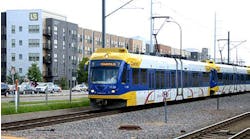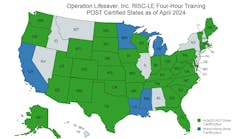The U.S. Department of Transportation (DOT) announced Sept. 6 a $1.4 million grant to upgrade 42 miles of track along the Northcoast Rail Corridor.
The project is one of 52 transportation projects in 37 states that will receive a total of approximately $474 million from the DOT’s Transportation Investment Generating Economic Recovery (TIGER) 2013 discretionary grant program. Federal Railroad Administrator Joseph Szabo attended the event.
“These TIGER projects are the best argument you can make for investment in our transportation infrastructure,” said U.S. Transportation Secretary Anthony Foxx. “This project in New Hampshire supports President Obama’s call to ‘Fix it First’ and strengthen the freight system that is so important to our nation’s economy by improving safety and reliability while increasing the speed of trains traveling through the corridor.”
This project will improve safety and reliability while increasing the speed of trains traveling through the corridor. The upgrade will improve the capacity and overall performance of the line while reducing lifecycle maintenance costs, and help ensure environmentally sustainable freight movement. In addition, the improvements will help the New Hampshire Northcoast Railroad maintain the growth in shipments it has experienced in recent years.
The New Hampshire Department of Transportation’s $2 million project is also partially funded by the state of New Hampshire with a $150,000 grant, as well as a private sector investment of $450,000 from the New Hampshire Northcoast Corp. This “Fix it First” project includes renovating the entire 42-mile track structure so that 286,000-pound cars can be used, repairing and refurbishing almost a mile of track that was washed out in 1993, and upgrading two highway-grade crossings along the corridor.
This grant is one of 17 rail grants totaling $146.2 million in this round of TIGER. Since the program’s inception, there have been 48 rail grants totaling $808.6 million.
“This is yet another example of how federal and state governments are working together to improve rail service and grow our economy,” Szabo said.
The highly competitive TIGER program offers one of the only federal funding possibilities for large, multi-modal projects that often are not suitable for other federal funding sources. These federal funds leverage money from private sector partners, states, local governments, metropolitan planning organizations and transit agencies. The 2013 TIGER round alone supports $1.8 billion in overall project investments.
TIGER has enjoyed overwhelming demand since its creation, a trend continued by TIGER 2013. Applications for this most recent round of grants totaled more than $9 billion, far exceeding the approximately $474 million set aside for the program.
The projects funded through this round of TIGER illustrate the president’s goals of creating “Ladders of Opportunity” that connect people to jobs, repairing and replacing aging infrastructure with a “Fix it First” approach and contributing to America’s economic growth.
On March 26, 2013, the president signed the FY 2013 Appropriations Act, which after sequestration provided $474 million for Department of Transportation national infrastructure investments. Like the first four rounds, TIGER 2013 grants are for capital investments in infrastructure and are awarded on a competitive basis based on the published selection criteria. This is the fifth round of TIGER funding.
Under all five rounds combined, the TIGER program has provided more than $3.6 billion to 270 projects in all 50 states, the District of Columbia and Puerto Rico. Demand for the program outweighed available funds, and during all five rounds, the Department of Transportation received more than 5,200 applications requesting more than $114.2 billion for transportation projects across the country.


